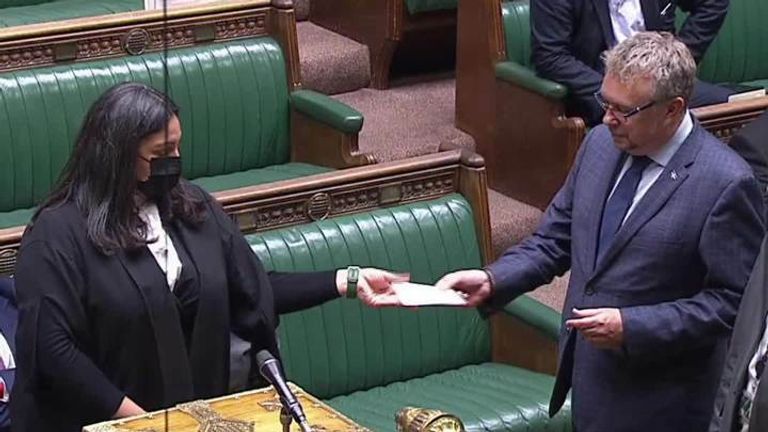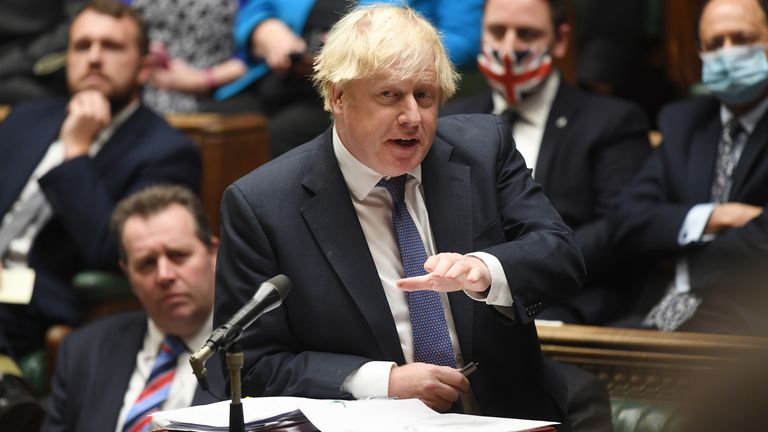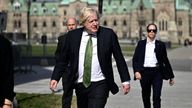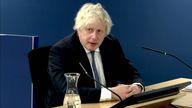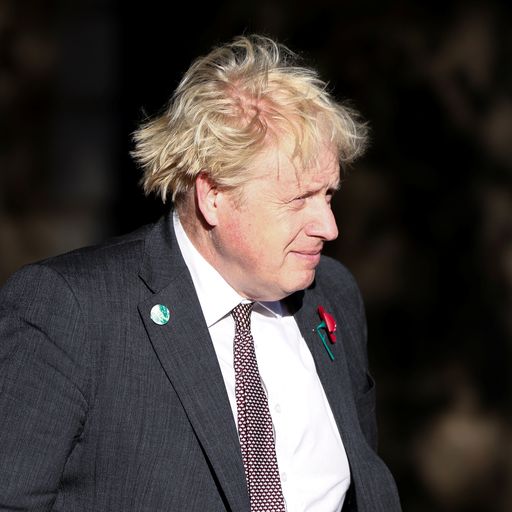MPs back government plans for second job reform - but Labour accuses Boris Johnson of 'watering down' proposals
MPs back Boris Johnson's approach to curbing MPs' outside interests amid Westminster's sleaze row, but Labour say the proposals have been "watered down".
Wednesday 17 November 2021 23:20, UK
MPs have backed the government's approach to curbing MPs' outside interests, after Labour's proposals were voted down in the House of Commons.
Labour leader Sir Keir Starmer used one of his party's designated opposition day debates in the Commons to put forward a motion setting out his party's plans for banning MPs from paid political consultancy work following Westminster's sleaze row.
But in a bid to steal a march on the opposition, Prime Minister Boris Johnson announced he backed such a ban and put down an amendment setting out the government's own approach.
This was passed, by 297 votes to zero, after Labour and other opposition MPs chose not to vote against the government amendment on Wednesday night. Labour's own motion was earlier defeated by 282 votes to 231.
The turn of events sparked a furious response from Labour, who accused ministers of "watering down" the party's original motion and effectively making it non-binding.
And the move from the prime minister also risked inflaming tensions with his Tory backbenchers, amid questions and concerns at the scope of such a ban and which roles will be affected.
The prime minister's efforts to curb MPs' second jobs came after a fortnight of sleaze allegations at Westminster prompted by the Owen Paterson lobbying scandal.
Earlier, Mr Johnson finally admitted the Conservative ex-minister had broken lobbying rules - two weeks after he encouraged a bid to save Mr Paterson from a Commons suspension.
And, according to an MP who was present, the prime minister - as he spoke about his handling of Mr Paterson's case at a meeting of the 1922 Committee of Tory backbenchers later on Wednesday - said: "On a clear road I crashed the car into a ditch."
After he saw Labour's own plans on tackling the sleaze row defeated in the Commons, the party's leader Sir Keir Starmer said: "We put forward a plan of action to clean up politics and strengthen standards in politics.
"If you can believe it, after two weeks of Tory sleaze and corruption, the prime minister whipped his MPs against that plan of action.
"Frankly, he just doesn't get it."
Sir Keir said his party would "press on" with their own plans for curbing MPs' outside earnings and was "not prepared to have them watered down".
He added Labour would engage in cross-party discussions on changing rules on MPs' second jobs, but highlighted how there had been talks "for many years and we haven't had progress - that's the problem".
Sir Keir also suggested the last fortnight of Westminster's sleaze row, which has focussed on MPs' second jobs, had damaged Mr Johnson's standing.
"I've been really struck by how many Tory MPs seem to have lost faith and confidence in the prime minister," he said.
"It was notable at Prime Minister's Questions today that their benches were with many gaps, many MPs hadn't turned up to support him.
"So I sense the idea that he's good at a joke has worn thin, and the joke isn't funny anymore."
Labour's defeated motion said MPs should be banned from holding second jobs involving acting as a parliamentary strategist, adviser or consultant.
It also would have instructed the Committee on Standards to come up with plans to implement this move and to report back to the Commons by the end of January.
And it said MPs should have been able to force a debate on the contents of such a report if the government did not schedule a debate on it within 15 days of the recommendations being received.
Four Conservative MPs - Peter Bone, Philip Hollobone, Nigel Mills and Dan Poulter - were listed as voting in favour of the Labour motion as they rebelled against the government.
The prime minister set out his own plans on curbing MPs' outside interests on Tuesday, at the same time as Sir Keir was holding a news conference on the issue.
Unlike Labour's motion, the government amendment did not explicitly endorse the findings of a 2018 report on MPs' second jobs from the independent Committee on Standards in Public Life.
Their amendment said the report - and its recommendation of a consultancy ban - formed the "basis of a viable approach which could command the confidence of parliamentarians and the public" and believed that its recommendations "should be taken forward".
In addition, the government motion expressed support for "cross-party work", including from the Committee on Standards, to bring forward proposals to update the MPs' code of conduct by the end of January.
However, there was no provision for a debate in the Commons on such proposals.
And the amendment made no mention of a proposal Mr Johnson included in a letter to Commons Speaker Sir Lindsay Hoyle to investigate and punish MPs who prioritise outside interests.
Subscribe to the All Out Politics podcast on Apple Podcasts, Google Podcasts, Spotify, Spreaker
After Wednesday night's votes, a government spokesperson said: "The House of Commons has tonight voted to update the Code of Conduct for MPs.
"This means that MPs will be banned from acting as paid political consultants or lobbyists and that MPs are always prioritising their constituents.
"This will strengthen our parliamentary system and we will work on a cross party basis to achieve this."
During a debate prior to Wednesday night's votes, Commons leader Jacob Rees-Mogg said MPs' expertise should "not be for sale".
But expressed the government's view that it is an "historic strength" of the parliamentary system that there are MPs "with a broader range of talents and professional backgrounds".
